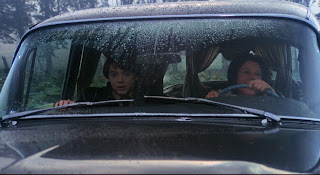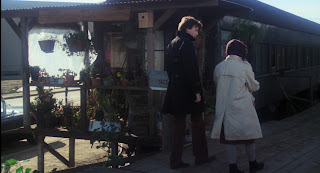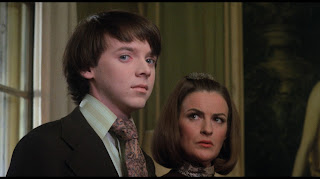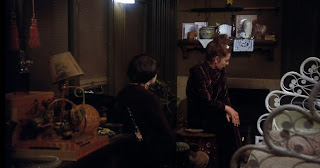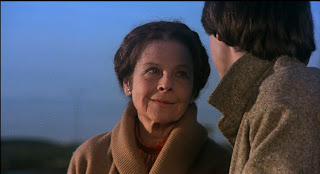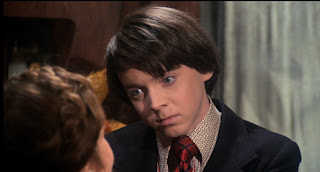Many, or probably most, of the “art”
films that came out of Europe in the 1970s had as their principle “vice” sex,
not violence. In Hollywood, it was exactly the opposite then as it is now; while “sex” is kept
under wraps, violence is glorified—and people want to know why "sex" is so
often equated with violence in this country, when it has to be “forced” out, or why people in this country are mostly apathetic upon news of the latest mass killing? Mass murder is just part of everyday life; sex, on the other hand, can destroy a life with just its mere mention.
Then there is the cult classic Harold and Maude from 1971, Hal Ashby’s black comic ode to European “art” film sensibility. But neither sex or violence is the “vice” of this film, but a morbid fascination with death. Yet even as its principle protagonist appears to have suicidal tendencies, there is still the sense that he seeks a reason to live, and he finds it in a most unexpected place. So we will take a look at the new Paramount Presents Blu-ray, supposedly a 4k transfer from the original camera negative, and a (slight) upgrade over the previous Criterion release.
Harold and Maude begins with someone entering the room of an apparently quite large mansion. This person puts on a record…
…a Cat Stevens song, something about how to provide meaning to one’s life. We observe that this person, whose face we don’t yet see, putting on a name tag, lighting candles and stepping on a stool, all very curious:
Someone else enters the room; Mrs. Chasen (Vivian Pickles, who played the title character in Ken Russell’s Isadora). She is a widower whose husband had some peculiarities that he apparently passed on to his son. She is undisturbed by the apparent suicide-by-hanging; it appears she has seen this kind of thing before:
We now see the face of the son. Harold (Bud Cort), who we think is just trying to get some "attention" from his mother, but she merely reminds him what time dinner is before she leaves the room:
Harold sometimes goes too far even for his mother with this behavior; during dinner she tells her guests that ever since he was a baby Harold has been “prone to every kind of illness," and some of it is clearly psychological. Later she enters the bathroom to find blood everywhere…
…and finds Harold in the bathtub, apparently faking slitting his throat and wrists:
For once she can’t “take any more” of this, so Harold is sent to see a psychiatrist. Note they are wearing the exact same clothes, even the same weird tie. He is asked what activity gives him special satisfaction?:
Going to funerals. Here we see Harold going to a junkyard to buy an old hearse…
…and at the funeral of a complete stranger:
Harold notices an old woman by a tree eating an apple. She seems to be looking at him, but he pays her no mind:
Harold arrives with his new wheels, which of course attracts the disturbed attention of his mother and her friends:
Eating lunch alone, his mother tells him he must stop these “amateur theatrics”; perhaps a talk with Uncle Victor will help:
“Uncle Victor” is an Army general, minus an arm. He tries to convince Harold what great times he would have in the Army. He claims to see a little “Nathan Hale” in him, who was shot as a spy by the British during the American Revolution:
This talk apparently did not help, because next we see Harold floating face down in the swimming pool; his mother gives him a “not again” look at she takes her swim:
Back at the psychiatrist’s office, Harold admits to “attempting” suicide 15 times. Are they for his mother’s benefit? No, “benefit” is the wrong word, since that would mean it is meant to be “helpful”:
Mrs. Chasen tells Harold that he must put away childish things and take on adult responsibilities—meaning getting married.
At another funeral, Harold becomes aware of someone speaking to him:
The old woman who was at the other funeral is trying to get his attention from across the aisle, but he ignores her:
She then gets out of her seat and sits behind him. She asks Harold if he wants some licorice, which he declines. She observes that the deceased (who neither of them know) is the right age to die at 80; she will be 80 next week. She also can’t understand this mania with wearing black; they don’t send black flowers that are dead to funerals, do they?:
Harold finds out her name in Maude (Ruth Gordon). When they leave the church Maude gets into a Volkswagen parked in front of the church, and asks Harold if knows how to sing and dance; she didn’t think he did as she drives off:
The priest seems to be disturbed as she drives away: it’s his car:
Back home, his mother is working on her project to get him married to someone who isn’t fat and ugly. She has found a national computer dating service:
While she’s asking—and answering—the “personality interview” questions meant for him, Harold removes a handgun from a box and eventually points it at his head while his mother continues with the “interview”:
The gun goes off and Harold falls over in the chair, to which his mother merely responds “Harold, please” and continues with the questions. Do you have ups and downs for no obvious reason? “That’s you, Harold”:
Harold is at another funeral, and the proceedings are interrupted when Maude tries to get his attention:
After the funeral, Harold prepares to leave in his hearse, but he finds Maude driving it. She admits to the priest that she had driven off in his car…
…and in return gave him a painting of a “saint,” which he didn’t like; Maude tells him to give it time to appreciate it:
Maude marvels how they keep bumping into each other at funerals (they are such “fun”); they are just part of the “great circle of life.” She also makes Harold think about life with her driving:
Maude offers to drive him home, but Harold tells her that this is his car, so he should drive her home. She lives in an old train car:
Harold points out that her stealing cars might upset people, but she claims that people shouldn't have such a hold on “things,”—“here today, gone tomorrow”:
Maude’s home looks like an antique shop; she intimates that some of it may be “found” items, the birds she may have acquired by “liberating” them from pet shops. Harold has an appointment, but promises to come back to visit:
The appointment is with the shrink again. He tells Harold he can’t help him if he doesn’t “open up” about his issues, which Harold responds to by snoring on the couch:
Harold’s first date, Candy, arrives:
They see Harold outside, wrapped in a blanket and holding a gasoline can:
While his mother and Candy chat amiably, Harold seems to be doing something odd:
There is a small bonfire outside, and Candy believes Harold has set himself on fire:
As Mrs. Chasen welcomes Harold into the room, Candy is hysterical at the scene outside…
…and runs away, as Mrs. Chasen, perhaps used to Harold’s shenanigans, doesn’t seem to understand her fright. Harold grins knowingly at the camera, and his mother wonders what he has done:
Harold visits Maude, and finds her inside a barn where she is apparently serving as a nude model for an ice sculptor:
When asked, Harold tells Maude he doesn’t think its “wrong” for her to model nude.
Feeding her birds, she mentions that the world “dearly loves cages.” She shows him a couple of her paintings...
...and an “odorific” machine from which you can inhale various smells that enable you to imagine that you are in different places…
…then to a sculpture of some sort which one can touch for “tactile” sensations:
Harold asks her how she keeps so fit, so she demonstrates her breathing technique:
But she says she can feel her body giving out now, and it will all be over on Saturday. But enough about her, what about him? What does Harold like to do when he’s not attending funerals? Building demolitions?:
But that can’t enough. What does Maude mean? She takes him to a greenhouse. She doesn’t like seeing things destroyed, she likes seeing things grow. Things that grow and bloom and die and turn into something else—that’s life:
She would like to change into a sunflower. Harold doesn’t know what he would like to change into. How about a daisy? But they are all the same. No they are not; some are smaller, some are fatter, some grow to the left, some to the right—all kinds of observable differences. Maude believes that much of the sorrow in the world comes from someone being treated one way when they really are something else:
They talk in what appears to be a military cemetery, where the tombstones all look the same, but the people underneath were different from each other:
While driving through town, Maude sees a little tree that is in “trouble.” It’s suffocating from the smog, she says. They have to save it:
Maude’s illegally parked car draws the attention of the police…
…but Maude, who has acquired “master keys” for virtually any car, merely drives off in another:
Back in her place, Maude observes that “consistency” is not a human trait. Harold points to an old umbrella hanging on the wall; Maude reveals that she is an immigrant, and grew up during the times of kings and queens. She remembered using the umbrella for protection during political rallies, fighting for “big issues” like “liberty, rights, justice.” Then kings died, kingdoms fell. But she didn’t mind those times. What sense “borders and nations and patriotism?” She misses the glamor of kings; she remembered visiting a garden party as a child at the Austrian emperor’s palace in Vienna, seeing all the officers in their fine uniforms. She seems to once had a privileged life when she was young, but that changed by the time she came to America. Harold had never seen her so sad and pensive. She still “revolted,” but now only in little ways, like stealing cars and canaries from pet shops—as long as it is for a good cause:
But she peps up and goes to the piano and sings a song about “a million ways to go”:
And them gets up and starts dancing. Harold finds this all quite fascinating:
Does Harold play a musical instrument? No? Well, maybe there is something in this closet that he learn to play, like a banjo, which is "different":
Next we see Harold in the garden back home strumming the banjo:
But then his mother arrives, informing him that she has her own gift for him…
…an expensive Jaguar, which Harold isn’t particularly thrilled with, since he likes his hearse…
…maybe he’ll make some “adjustments” to it:
Meanwhile, he joins Maude to “save” that little tree, but she sets off an alarm after failing to pay toll fare. This attracts the attention of a motorcycle patrolman (Tom Skerritt in a cameo appearance):
Maude doesn’t seem to have a driver’s license; she doesn’t “believe” in them. She also admits that the vehicle she’s driving isn't hers:
While the officer asks about the “straight” story, Maude says “Nice chatting with to you” and drives off to the open-mouthed astonishment of the officer:
As she is pulled over again, Maude waits till he approaches and then starts driving in circles, causing the officer’s bike to stall:
They plant the tree in the woods; Maude marvels at all the living things around them:
Then they pass the officer again…
Who tells the lady that she’s in “a lot of trouble”…
…and while he’s taking a look inside the car, Maude and Harold drive off in his motorcycle:
At Maude's place, Harold admits he’s learning a lot of “vices” from her, but Maude says its “best not to be too moral. You cheat yourself out of too much life. Aim above morality. If you apply that to life, then you are bound to live it fully”:
Harold admits that he hasn’t
“lived” and has “died a few times.” On one occasion, he was messing around in the
chemistry lab at school and caused a massive explosion and fire. He wasn’t
hurt, but he snuck back home with no one seeing; two policemen arrived and told
his mother he was killed in the fire. He observed from above his mother’s
reaction, apparently the first time she showed any kind of “feeling” about
him; starting to sob, Harold admits that from that time he decided he preferred to
be “dead” if that is what it took for his mother to show some affection for him:
Maude tells him not to back away from life, take a chance even if you get hurt. Harold admits that he likes her, and vice-versa, and they get up and dance together:
Mother brings him another date…
…and shows her Harold’s new Jaguar, which after some “fixing up” now looks more like a hearse:
In the drawing room, Edith talks about her job as a file clerk at Henderson Feed and Grain:
She’s a normal girl, and Harold shows her that he’s not “normal”:
This is the last straw for his mother. She informs Harold that she has instructed his uncle to have him drafted into the Army for his “own good”:
Harold visits Maude about his problem, and she thinks that their combined “skills” can keep him out of the Army. Uncle Victor, however, tells Harold he’ll “love” the Army. It has its drawbacks (looking at his missing arm), but the Army takes care of you:
They arrive at a park by the sea and the general talks about war, and how this country should have kept having the Germans as the enemy, because fighting the Jerries was the kind of war the whole country can support. The Krauts are worth killing, not those people in Southeast Asia. “That’s pretty strong stuff” says Harold:
Harold pretends to be fascinated by his war stories and all the killing, and the becomes seemingly over-enthused about the prospect doing some killing and maiming of his own, which starts to disturb his uncle:
Then they see Maude with a “peace” sign, and Harold calls her a “commie bastard” and to “get the hell out of here.” Uncle Victor seems to become concerned about Harold’s previously unknown lust for blood:
Maude runs off and Harold goes after her threatening to kill her. Uncle Victor tries to stop him, and Maude falls through a hole into the water. Obviously Harold is not “fit” for service:
Maude is fine, and they meet again in a field. He asks her if she “prays”; no, she communicates, not with God but with life. Being out in field like this makes him feel nice, and to do somersaults. Then why doesn’t he? Because it makes him feel stupid. Maude says that “everyone has the right to make an ass out of themselves:
So Harold gets up and does some somersaults:
At a pier, Harold tells Maude she is beautiful, and she says he makes her feel like a schoolgirl:
Harold can’t meet her for lunch tomorrow, because his mother has another arranged “date” for him. Taking her hand, Harold notes that she has numbers tattooed on her arm. Was she a Nazi concentration camp survivor? Maude seems to confirm this when she mentions something that Alfred Dreyfus said about the birds he saw while on Devil’s Island:
This knowledge only seems to bring Harold closer to Maude, which she can now sense as they cling to one another watching the seagulls:
Mrs. Chasen warns Harold that this is his “last chance,” so at least be serious about this. The date’s name is “Sunshine,” an actress who appears to be a little “eccentric” herself:
Harold and Sunshine go into another room, when after some idle chit-chat Sunshine mentions she likes knives, which happen to be hanging around. Harold picks one of Japanese origin and lays out a mat…
…and then goes into his playacting, this time stabbing himself to death:
But instead of running away, Sunshine seems fascinated by this. She seems to realize that this wasn’t “real,” because it isn’t in the movies:
She takes the same knife, and plays the scene in which Juliet, rather than Romeo, stabs herself:
Except of course, she doesn’t know the rules of the game, and kills herself:
That’s your last date, his mother tells him:
That night Harold and Maude go to a fairground; the rollercoaster wasn’t that scary to her:
Harold has a present for her, a ring inscribed “Harold Loves Maude.” She tells him that Maude loves Harold, too.
Maude throws it in the water, but tells a startled Harold that she did it so that she’ll always know where it is. Fireworks go off, and next we see Harold and Maude sleeping together; presumably they made love:
Back at home, Harold tells his mother that he is getting married, and shows a picture of Maude to her; naturally she is not “amused”:
Next we see the Harold being lectured first by Uncle Victor, his psychiatrist and then the priest about his choice of mate; the priest in particular has “issues” with a “firm young body” comingling with “withered flesh,” “sagging breasts” and “flabby buttocks,” which makes him want to “vomit”:
Their advice has no effect on Harold. He gives her a surprise birthday party:
As Harold kisses her, she tells that “I couldn’t imagine a lovelier farewell”:
Which of course stuns Harold. Today she is 80 years old, and she took a bottle of pills that will kill by midnight:
Harold calls an ambulance. He tells Maude he loves her and he will not let her die, but she tells him to just go on living and love some more. Harold tells her he will never love again:
At the hospital as Harold desperately tries to get Maude attention…
…she realizes what she truly meant to him and seems regretful:
From here we see cuts from Harold driving down roads in his hearse, to his waiting in the hospital for news about Maude. After being told that Maude is dead, Harold drives the hearse toward a cliff…
…which plunges downward and crashes on the beach:
But Harold was not in the hearse when it went over. We see him on top of the cliff, with the banjo that Maude had given him:
We can wonder if to Maude, Harold was initially just some lost person vulnerable to an eccentric individual's last “fling” with life. Surely she hadn’t spent most of her life “revolting” against civil society in this way without any kind of punishment before she met Harold. But this film wants us to believe that she saw in Harold someone who needed her kind of help, and it is easy enough to believe that. We realize at the end that Maude's eccentricities come from a "revolt" against the hypocrisies of a world that claims to be one thing, and is quite another in reality. Her thoughts about the world having a fascination with cages didn’t just mean for birds or criminals; she knew about cages too, although the circumstances of which are only briefly implied.
Still, by the end we can see that for Harold, his relationship with Maude was the first time he actually felt “alive,” and being without her was to be "dead." Perhaps Maude realized too late that this wasn’t a “game” anymore, at least not to him. The question would then be as Harold was taking his drive, would he start thinking about the things that Maude had told him about life, and not end it all for real.
Apparently he did do some thinking; Maude would have wanted him to live, as an affirmation of her own life. Some of us probably wish we had known someone like Maude when we were young, who “understood” us when those closest to us only thought our “future” was being dead or in jail. For Harold, the Army probably would have meant a stint in Vietnam, and perhaps we suspect that the opportunity for real death there when he was really just “playacting” at it before was the reason he sought to avoid it. Besides, he lived in wealth and had plenty of money to spend, and why would he give up the freedom that money gave him to "play"? But for me, the Army wasn’t so much a surrogate family (since I still kept to myself), but provided an environment free of fear and loathing. There was no one like Maude who was there to show me that life wasn’t just something where you avoided doing anything because they made some people mad and some punishment that was more like torture was in store for you. I wonder how many people know what I am talking about.
For Harold, death was a way to get his mother's attention, although he had tried it so often it no longer worked; she only looked to others to "fix" him. But for Maude, death was just a part of the circle of life, just as birth is. Funerals are not “fun” because someone died, but because it is an affirmation of the circle of life; life ends, life begins again.
Maude’s habit of stealing
cars is just a way for her to remind herself that she is still alive; every car
she steals adds some new “experience” for her. She isn’t much concerned about
how people feel about her stealing; to her, it means they have to be reminded
not to take life for granted. Her home is full of objects we suspect were
stolen or “found”; her pet birds she also admits were “liberated” from pet
stores. For her, it is a matter of what or who more meaningfully benefits from her actions.
So why does she pick Harold out of anyone else to have her last “fling”? We want to believe that it is because she sees someone who attends funerals not because it is a part of life, because there is something already dead inside of him. She can “pep” him up—even if it is just for her own amusement, at least initially. But Maude does provide Harold with not just some sound advice, but action as well; although it might not be wise for everyone, Harold is the kind of person for whom simply breaking out of his shell isn’t enough; in Eugene O’Neill’s The Iceman Cometh, all Hickey’s goading and shaming did was persuade his listeners to take a few steps out the door, but they soon returned to their pointless lives spent drinking and “pipe-dreaming.” Harold has to be shown how to live as well.
We don’t know it yet until late, but Maude knows something about how life can destroy the soul and death is just around the corner. She knows what it is like to be an anonymous "number" in a cage. Like the daisies in the field which all seem to be same, there are subtle differences between them. Harold is unhappy, she says, because he is this flower, yet treated like that one. He is like the nearly dead tree that can’t breathe, that has to be planted in rich earth to live.
For Maude, death is merely an affirmation of her long life; Harold still has his life ahead of him, and Maude has tried to show him that there is so much in life with so many possibilities, and why waste it? Harold didn’t just send a car over the cliff, but the car that he had fashioned into a hearse, a symbol of death. The fact that he was not in the car meant that he was discarding his fascination with death; walking away with the banjo that Maude had given him, he decided to make his own kind of music. Although it was not part of the film, the Cass Elliot song at the time perhaps summed it up better than any of the Cat Stevens songs:
Make your own kind of music
Sing your own special song
Make your own kind of music
Even if nobody else sings along



























